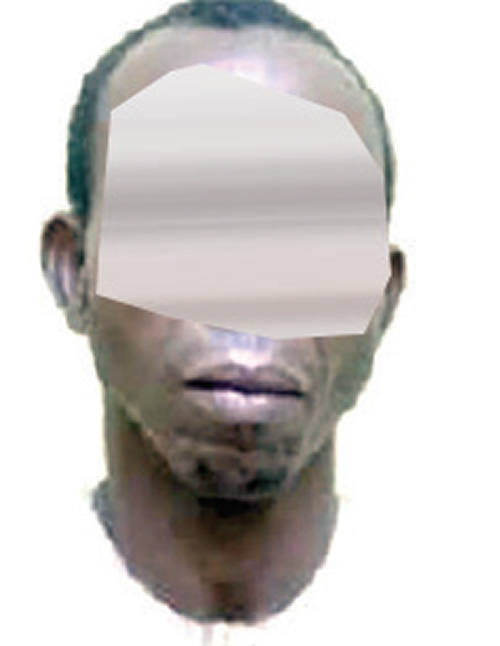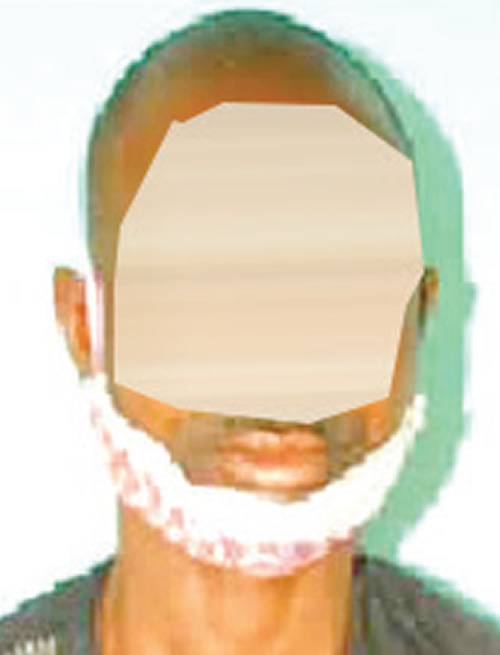Janet Ogundepo writes about the demeaning acts of fathers who abuse their daughters sexually
It came as a shock to many when news broke that a middle-aged man in Akwa-Ibom State, Joseph Sunday, raped his two daughters.
The daughters aged nine and 13 were said to live with their father when the act was committed.
Upon his arrest by the police, Sunday said he had been celibate for some years after he was separated from his wife and needed to confirm if he was still potent.
The eldest daughter who he had turned into a sex toy reported him to the police which led to his arrest.
The father who had also become jealous of his daughter scolded and beat the 13-year-old, having suspected she was having an affair with another man.
The PUNCH had reported the man as saying, “My wife left me some years ago because of some family issues and relocated to Rivers State. I have been the only one taking care of my daughters. I just wanted to test if my manhood was still functional.”
For thirty-seven-year-old Wasiu Orilonise, he told an Oyo State Magistrates Court that he committed incest with his 15-year-old daughter while carrying out a virginity test on her.
However, what started as a virginity test became twice daily sexual abuse before his arrest in 2019.
He claimed that since the demise of his wife some years ago, he had solely taken care of the victim and her siblings.
Facts, figures
Incest is a crime of marriage, cohabitation or sexual intercourse between two or more closely related people such as between a parent and child(ren), siblings or grandchild.
Incest is a criminal offence according to the customary and statutory laws of Nigeria. The Nigerian Criminal Code defined incest as an offence against morality.
Section 3 of the Matrimonial Causes Act Cap 220 LFN 1990 noted that the marriage of a man was prohibited if the woman is or has been his, “wife’s mother, wife’s grandmother, wife’s daughter, wife’ son’s daughter, wife’s daughter’s daughter, father’s wife, son’s wife, daughter’s son’s wife, sister’s daughter, brother’s daughter, mother’s sister, father’s sister, sister, descendant or ancestress.”
The act also prohibits the marriage of a woman if the man is or has been her “ancestor, descendant, husband’s father, husband’s grandfather, brother, father’s brother, mother’s brother, brother’s son, sister’s son, husband’s son, husband’s son’s son, mother’s husband, grandmother’s husband, daughter husband, son’s daughter’s husband, daughter’s daughter husband.”
Incestual rape is prohibited under Section 357 of the Criminal Code. It defines rape as an “unlawful carnal knowledge of a woman or girl without her consent or with her consent if the consent is obtained by means of threats or intimidation of any kind or by fear of harm or by means of false and fraudulent representation as to the nature of the act….”
According to Familypedia, the prohibited degree of kinship referred to a degree of consanguinity (relatedness) between which sexual interrelationships are regarded as incestuous. It added that inbreeding was a taboo across nearly all cultures globally but the line at such relationships varied.
The Lagos State Domestic Violence Law stated that incest was domestic violence and a “sexual abuse exploitation including but not limited to rape, incest and sexual assault.”
The United Nations International Children’s Emergency Fund stated that about 120 million girls under the age of 20 were victims of sexual violence. It added that about 90 per cent of adolescent girls were first forced into sex by a known person.
In its May 2022 report, UNICEF further stated that about five per cent of young women were victims of sexual violence during childhood.
A Germany-based consumer and data firm, Statista noted that between 2017 and 2019, there were 59 reported cases of sexual violence in Nigeria and female victims accounted for 56 of the cases.
Women At Risk Foundation reported that Africa had the highest prevalence rate of child sexual abuse. It gave the figure as 34.4 per cent. It stated that one in four females reported experiencing sexual violence during childhood. It added that 70 per cent reported being sexually violated more than once.
Between April and May 2020, during the COVID-19 lockdown, over 80 cases of incest were recorded and reported to have happened in Anambra State.
Before the lockdown, the state’s Ministry of Women Affairs, children and Social Welfare stated that it recorded 32 rape cases.
It stated that some fathers using the opportunity of the lockdown raped and threatened to kill their daughters if they exposed them.
In 2020, following the report of several rape cases, the wife of the President, Aisha Buhari, Amnesty International and ex-Vice-president, Atiku Abubakar, called on stakeholders to expedite action, ensure justice, declare rape as a national crisis and review the law on rape.
But the result has yet to be seen as rape, defilement and incest continue unabated.
From wives to daughters
Last month, a forty-nine-year-old dry cleaner in Ogun State, Amoda Bola, said that it was a mystery that he slept with his 14-year-old daughter four times.

The father of five explained that the victim was the only one he had slept with among his three daughters.
He also said that though he was not sexually attracted to the victim, he grabbed her and slept with her during those instances when they were alone in the house.
The dry cleaner added that he had divorced his wife and parted ways with his girlfriend.
Bola further claimed that his daughter had been sexually active before he first slept with her and had once taken her to a hospital to abort a pregnancy.
In an interview with Saturday PUNCH, Bola said, “I did seek help from a herbalist and he told me it was a spiritual issue. He told me to make a sacrifice which I did. I made the sacrifice just the Sunday before my arrest.”
In July, a father, Michake Ogbar, was sentenced to life imprisonment for raping his three daughters, a charge he pleaded not guilty to.
The judge, Justice Abiola Soladoye of the Ikeja Domestic Violence and Sexual Offences Court, Lagos, stated that Ogbar committed the act during the years his wife was not around.
The judge said, “This is a sad case and disgrace to parenthood. The defendant ravished his own daughters in turns, committing incest. It is rather shameful and most perverted.”
In 2019, a father of six, Sunday Julius, was arrested for incest against his daughters.
Julius was said to have first committed the act with his eldest daughter and was reported to the police. He was apprehended through the intervention of neighbours and family members.
He was later rearrested after his wife caught him molesting another younger daughter and reported it to the police.
As if that was not enough, for seven years, a resident of Niger State, Peter Ayemoba, was said to have been sleeping with his two daughters after he lost his wife.
Led by a ‘spirit’ that “kept telling him he was not the first man that slept with his daughter,” Ayemoba said he continued with the act.
He further stated that whenever his daughters rejected him, he would threaten to kill them and die by suicide.
Though he remarried after the death of his first wife, Ayemoba stated that he still slept with his daughters “at the slightest opportunity” until he was arrested by the police.

Like his partners-in-incest had claimed, Ayemoba blamed the act on the devil, expressing remorse and readiness to receive any punishment.
Besides, a father, Jacob Alonge, arrested by the police for incest, seemed unrepentant when he was arrested in 2019.
He was quoted to have said that he had done nothing wrong and that his 17-year-old daughter seduced him.
Alonge’s daughter, Gift, who became pregnant as a result of the act was said to have left the community where she lived with her father.
A magistrates court however sentenced Alonge to 21 years imprisonment without an option of a fine.
On Thursday this week, a 50-year-old man, Olukayode Joseph, was arrested for allegedly sedating and defiling his 14-year-old daughter.
Investigations and arrest of Joseph by operatives of the So-Safe corps in Ogun State revealed that he had committed the act many times. He was said to have confessed to the crime, “pleaded for mercy” and denied sedating his daughter and sleeping with her on many occasions. Joseph had been transferred to the Ajuwon Police Station for further investigations.
Damaged for life
Twenty-four-year-old, Hirhyel Hassan, said she was raped by her uncle, one of her father’s younger brothers, who came to stay with the family during a layover.
In tears, she expressed fear, trauma and anger she constantly faced at any playful touch or sexual gestures by the opposite sex.
But there are many other victims who continually carry the burden of the act.
The suspects, some of whom have received their comeuppance, were largely uninformed of the lifelong trauma and emotional pain they had subjected their victims.
‘Incest perpetrators risk banishment’
Some psychologists, psychiatrists, sociologists and practitioners of African traditional religion have stated implications of the act on the victims.
A professor of African and Comparative Religion/Culture at the University of Port-Harcourt, Rivers State, Wellington Wotogbe-Weneka, condemned the act, describing it as evil and a taboo in the context of African religion and culture.
He added that the punishment for such in the olden times was a nude public tour of the community by the perpetrator and victim.
Wotogbe-Weneka said, “Having sexual knowledge of a close relation is forbidden in its totality because it is evil before God and also before African gods. I don’t know of any religion that allows it at all. African culture forbids it, it is forbidden before the gods. It is a sexual aberration that should not happen.”
He stated that in the past, perpetrators and victims were either banished from the community or ostracised.
The fellow of the Academy of Religion added, “Staying in that community means that they would incur the wrath of the gods of the land who would not want to see such acts being committed on the land. The implications are obvious but the lighter one is that of trying to appease the gods by offering some ritual sacrifices to ward off the wrath of the gods.
“There are certain prescribed rituals that must be performed and through divination and traditional rituals, ascertain the mind of the gods whether they have been forgiven and they can remain.”
On why the victim suffered the same punishment as the perpetrator, he explained that the gods determined the consequences, adding that if the daughter did not seek help or resisted the act, she faced the same punishment as her father.
The researcher on Comparative studies of Afro-Caribbean religion and African traditional religion further said that after the cleansing, the victim in the future was free to marry but there was the belief that the victim might have difficulty during childbirth.
He, however, stated that modernisation had affected some of the rites performed in the olden days.
Also, a renowned Yoruba traditional religion, culture advocate and Ifa priest, Chief Ifayemi Elebuibon, stated that incest was a taboo in Yorubaland.
He recited an Ifa corpus about a man who married his mother and they had five children together and they all perished.
Elebuibon said, “Those misdeeds are called éwo. It’s a taboo, an abomination; it is what Yoruba concept calls an abomination, something that you must not do and there are a lot of people who are breaking the taboo.
“If a father rapes his daughter, it is also a calamity. What will end up for him is to perish. It is an abomination, a taboo in Yorubaland.”
On what would make a man commit such sacrilege, the Ifa priest noted, “Sometimes, some people were afflicted with a spell or a curse that the enemy might place on the person to misbehave. Or, if he is not on the right path from his early life and has been engaged in many wrongdoings and started from the little to the higher until they get conquered.”
Another professor of African traditional religion and inter-cultural interpretation at the Imo State University, Godwin Egbucha, stated that people who committed incest did it to seek greater spiritual levels.
He noted that such an act was an abomination and not practised in African traditional religion.
Egbucha said, “People nowadays have increased their spiritual makeup to behave in certain ways and to have spiritual gifts in the spirit world. Going to that particular place where you are not supposed to venture into sexually is Satan’s way of making people go there so that he will increase what they have in the spirit world.
“Nowadays, there are many secret societies in different levels and families that people will want to impress such things and in the process, this (incest) is one of the conditions they give to get some things. Those who ask about the possibility of doing such will be enticed with things but will not be told the reason.”
The lecturer added that excommunicating the father and daughter was the punishment meted out to offenders in the African traditional society to stop the act.
The member of the National Association for the Study of Africa Religion and Culture, added, “Making sure that he does not participate in any traditional rite and excommunicating him from the environment. He may be given some time ranging from three to 10 years. The father initiated the act but the lady who has followed to do such will go with the father. In such punishment, the normal thing is that when incest is committed, the offender will use force on the victim but if the victim cries out, the society comes to rescue her. But when no one does that, the lady must follow the father or brother or cousin to face the punishment.”
Families, victims face shame – Sociologists
A professor of Sociology and Criminology at the Olabisi Onabanjo University, Ago-Iwoye, Ogun State, Adewole Atere, said that incest was both a social vice and criminal behaviour, describing perpetrators as either mentally unstable or believed they could overpower their victims without resistance.
He stated that legal provisions and prescriptions by society prohibited sexual relationships between father to daughter, mother to son, brother to sister and any closely linked family relationship.
Atere added that the aberration left the victim psychologically down, bearing the emotional pain and agony of the incident and in constant fear of the opposite gender as a potential violator.
“It is bad enough that you want to have carnal knowledge of anyone at all by force but when it comes to a father-daughter relationship, it is more disheartening.
“The victim is psychologically let down because within the contact of the family, it becomes difficult to relate well with the father, the mother if she is aware of the occurrence would also not want to relate with the father because the assumption will be that the mother was not protective of the daughter enough and of course, all other members of the family,” he said.
The don added that the insistence of some family members to keep the cases out of courts prevented some victims from exploring the legal route.
He stated, “The child has all the right to protection by the family and when that does not happen, she will react. She cannot confidently relay such occurrences to her female friends who will jeer at her and make a mockery of her situation.
“Within the context of law enforcement agents, the victim may be further victimised. If, for instance, the case is reported in a police station and the lady has to go there repeatedly you begin to find some randy men, within the context of the law enforcement agency, also wanting to take further advantage of her. All of these weigh down the victim and make it difficult for her to lead a healthy life as it were.”
The lecturer stated that incestuous fathers needed medical examination to determine their mental capacity to be a father.
He added that findings of mental imbalance would further lead to clinical treatment as well as necessary punishment as compensation for the victim.
He further said that such perpetrators lost their claim of fatherhood.
Atere said, “The victim is at the losing end in most of the relationships whether with the siblings, parents, or even the violators. When you go beyond that level, you talk about her friends, males and females, the law enforcement agents and society at large. That is why most families would not naturally want to leak such information even if it is coming from someone outside the family, they still want to keep it from the view of the larger society who would now label the girl and make it more difficult for her.”
He further noted that daughters who got pregnant due to incest should be allowed to abort such pregnancies to prevent shame, ridicule and confusion.
On his part, another professor of Sociology at the Ahmadu Bello University, Zaria, Kaduna State, John Gyong, said that the excuses given by incestuous fathers for their acts were tied to demonic invasions.
He added that such acts had serious cultural implications in some societies, stating that perpetrators would face shame, isolation and their families ostracised.
Gyong further stated that the incidents would leave the victims permanently damaged.
The lecturer stated, “Nobody will want to relate or associate with that family in terms of marriage and other things. It also has other implications. On the part of the victim, it has permanent damage. Socially, emotionally, economically, physically and educationally, that person will suffer damage and will rarely be able to concentrate on any serious academic pursuit.
“Socially, she would be isolated and not able to find friendship and relate with others. Our relationship with friends, colleagues, classmates, relations and others is what makes us happy, so when you are isolated and cannot relate, that can even lead to even suicide.”
Gyong added that such incidents strained family relationships, left the victim emotionally downcast and could leave the home to be destitute.
He stressed that there was a sense of decency guiding the relationships between parents and children, stating that men separated from their wives who took care of their daughters had no excuse to develop romantic interests in them.
The sociologist added that indecent dressing among parents and children at home could further cause attractions that might lead to incest.
Psychiatrists, psychologists decry incest
A clinical psychiatrist, Dr Abel Obosi, decried the prevalence in cases of incest.
He added that fear, low self-esteem and revenge on less- threatening persons among others were the psychological implications of the incident on the victims.
Obosi said, “Those incidents come with fear from the perpetrator or inducement that can get the victim to play along and feel that it is normal. In either case, there could be issues of reduced self-esteem, post-traumatic stress disorder, depression and in the worst case, suicidal ideation and suicide.”
He added that victims who are aware of the implications of the act could become destitute especially when there was no reliable person to confide in.
The clinical psychiatrist further stated that the consequences were severe on the victims, stating that the incident could take a toll on their education, interpersonal relationships, community service and ability to keep a job due to the trauma.
Obosi called for increased awareness on the consequences of incest on the perpetrators, urging victims to speak out and seek help.
“Apart from the law taking its course, there can also be issues of personal losses in terms of shame, guilt and self-condemnation. Awareness should be increased. Everyone should know about it, how bad it is and that people should not engage in it.
“The victims should seek help and speak out. Non-governmental Organisations that target victims of incest should encourage victims who have been able to overcome it to become a model for those who are going through it to speak out.
“Adults and parents who were victims of incest and have not healed carry such experiences into their marriages and the community, so they don’t trust everybody and have reservations about discussing such issues. It is important that we begin to open up conversations in this area so that people can speak out, seek help, see a psychiatrist or psychologist and get their mental health sorted out,” he said.
Obosi added that rape was a precursor of mental health issues.
He said, “With respect to incest, there is scientific evidence to show that incest can cause mental breakdown both for the perpetrator and victim. The question now is how to go about it because it is a problem that we need to talk about. Some are ashamed to talk about it. Some are 18 or 19 and they don’t know how to come around to tell people that their father is sleeping with them and they just keep quiet, dying quietly in silence.”
In his comment, a professor of Educational Psychology at the University of Ilorin, Kwara State, Abdullahi Onimisi, stated that most abnormal behaviours stemmed from frustration which depicted that such a person was no longer mentally balanced.
He noted that some sexual offenders could be faced with certain unsolved problems and in finding a solution fall into the hands of ungodly persons, who would prescribe such acts as a way out of their problems.
Onimisi said, “Frustration is normally a result of not being content with what one has and not being godly in what one does because whosoever believes that there is a Being will not be so much frustrated in life. Whatsoever the level of one’s life there are others that are envious that one is happier than them.
“Frustration impacts a lot on human behaviour. One thing a man loves is to be happy with himself and with others but a man who feels he is not at that state will fall victim to certain things, when they are looking for a way out.”
He noted that moral values guided man’s actions, stating that offenders deviated from such expectations.
Force condemns act
In his reaction to the issue, the Force spokesperson, CSP Muyiwa Adejobi, described the situation as sad, unacceptable and inhuman.

He added that such crime carried the same punishment meted to sexual offenders.
Adejobi said, “It’s immaterial whether the suspect is a biological father of the victim or not, he will face the same punishment as specified by the law, aside from the moral, social and cultural disgrace or stigma he will receive.”
He added that the Force had embarked on advocacy and public awareness to curb the societal menace in all forms.




